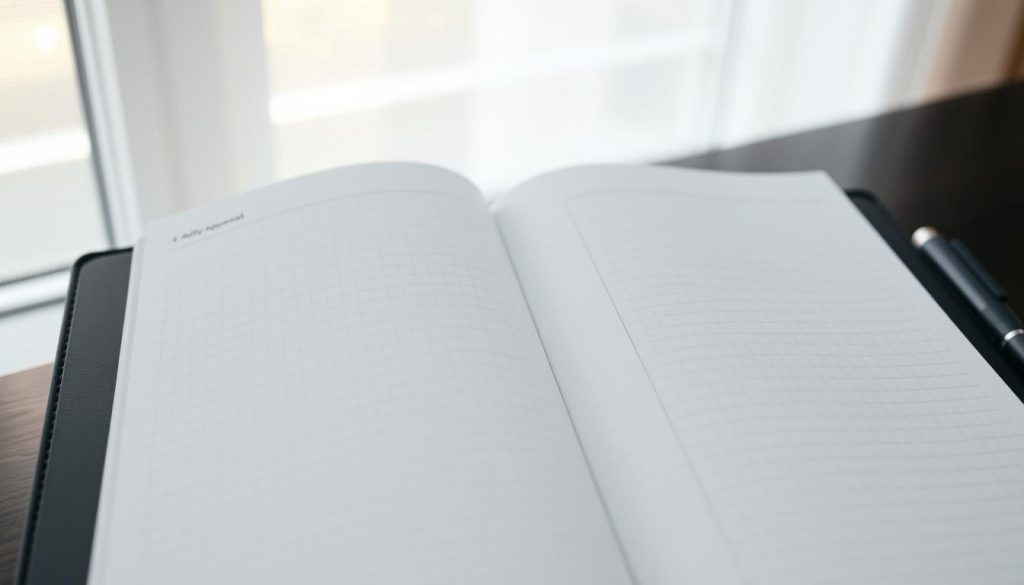Journaling can be a compass in the maze of your thoughts. It offers unique paths to self-discovery. Daily writing and reflection writing serve different purposes in personal growth.
Daily journals and reflection journals differ greatly in their approach. They’re like snapshots versus deep-dive documentaries of your life. Each type helps you understand your experiences, emotions, and personal development.
Journaling has proven benefits. 80% of regular users report better self-awareness. 75% say it helps organize thoughts and clarify decisions.
Your journal can be a space for daily events or deep emotional exploration. Daily journals record the what, where, and when of life. Reflection journals dig into the why behind your experiences.
These writing practices are powerful tools for growth. They help with self-understanding and emotional clarity. Let’s explore the unique features of daily and reflection journals.
Understanding Journaling
Journaling is a powerful tool for self-reflection and personal growth. It can transform your understanding of yourself and the world. Your journal becomes a mirror, reflecting your inner thoughts and feelings.
Different types of journals offer unique ways to explore your inner landscape. You can track emotions, capture memories, or work through personal challenges. Journaling provides a flexible format for deep self-discovery.
What is Journaling?
Journaling is a structured approach to self-expression. It goes beyond simple record-keeping. It involves exploring personal thoughts and feelings.
- Exploring personal thoughts and feelings
- Tracking emotional patterns
- Supporting personal growth
- Creating a safe space for reflection
The Importance of Journaling
“Writing is a form of therapy; sometimes I wonder how all those who do not write, compose, or paint can manage to escape the madness, melancholia, the panic and fear which is inherent in a human situation.” – Graham Greene
Research shows that consistent journaling can lead to significant personal benefits. These benefits can improve various aspects of your life.
| Journaling Benefit | Potential Impact |
|---|---|
| Emotional Processing | Increased feelings of relief and calm |
| Self-Awareness | Enhanced understanding of personal triggers |
| Mindfulness | Improved emotional regulation |
Your journal can become a powerful companion in your journey of self-reflection. It helps you capture moments and process experiences. You can gain insights that might otherwise go unnoticed.
What is a Daily Journal?
A daily journal captures your experiences, thoughts, and personal growth. It turns everyday moments into valuable insights. This practice helps you track your life’s journey with purpose.

Daily journaling is more than just record-keeping. It’s a dynamic way to document your life’s story. This habit helps you develop self-awareness and personal discipline.
Purpose of a Daily Journal
Your daily journal acts as a personal chronicle. It’s designed to:
- Capture daily experiences and emotions
- Track personal growth and progress
- Provide a space for writing prompts and self-reflection
- Create a consistent record of your life’s journey
Common Practices
Effective daily journaling involves several key practices:
- Choose a consistent time for writing
- Use structured or free-form writing approaches
- Include diverse writing prompts
- Reflect on both positive and challenging experiences
“Journal writing is a voyage to the interior” – Christina Baldwin
| Journaling Aspect | Recommended Practice |
|---|---|
| Frequency | Daily, preferably at same time |
| Duration | 5-15 minutes per session |
| Content Focus | Personal experiences, emotions, goals |
Daily journaling is a powerful tool for self-discovery. It can transform how you understand yourself. This practice helps you document your life’s path in a meaningful way.
Features of a Daily Journal
Daily writing can boost your personal growth journey. A journal is more than record-keeping. It’s a powerful tool for habit tracking and self-reflection.

Understanding a daily journal’s unique traits helps create a meaningful writing practice. Find a style that fits your lifestyle for the best results.
Structural Insights for Effective Journaling
Your daily journal can take many forms. Each format captures your experiences and thoughts differently. Choose a structure that matches your personal writing style.
- Chronological entries tracking daily events
- Bullet-point summaries of key moments
- Thematic approach focusing on specific life areas
- Prompt-based writing to stimulate reflection
Frequency and Timing Strategies
Consistency is key in journaling. Regular writing can greatly impact your mental well-being and personal insight.
| Journaling Frequency | Potential Benefits |
|---|---|
| Daily (15-20 minutes) | Enhanced emotional regulation |
| Weekly | Improved self-reflection |
| Sporadic | Limited personal growth impact |
“Your journal is a safe space to explore your inner world, one page at a time.” – Anonymous
Some people prefer morning reflections, others enjoy evening writing. Choose a time that feels comfortable and sustainable for you.
What is a Reflection Journal?
A reflection journal is a powerful self-discovery tool. It dives deep into your experiences and inner world. This journal helps you understand your thoughts, emotions, and personal growth better.
Schön’s research identifies two types of reflection writing. These are Reflection In-Action and Reflection On-Action.
- Reflection In-Action: Thinking and making decisions in the moment
- Reflection On-Action: Analyzing experiences after they have occurred
Purpose of a Reflection Journal
Reflection journals aim to boost self-understanding. They create a space for introspection and personal growth. Research shows that reflective journaling can lead to significant insights in various life areas.
Differences from Regular Journals
Reflection journals analyze experiences, unlike daily journals that record events. They follow the three “W”s of reflective writing:
- What: Describing the experience
- So What?: Interpreting its meaning
- What’s Next?: Determining future actions
Studies indicate that participants experience a 40% increase in emotional clarity through structured journaling practices.
Digital journaling apps have made reflection writing more accessible. They let you add multimedia elements and track your growth journey easily.
Key Features of Reflection Journals
Reflection journals offer a powerful tool for personal growth and self-discovery. They help you explore your experiences, thoughts, and emotions deeply. These journals go beyond traditional writing methods.
Reflective writing is a transformative practice. It allows you to explore your inner world with intention. You can gain clarity through this process.

Focus on Self-Assessment
Self-reflection is the heart of a meaningful journal. This approach helps you examine your experiences critically. It also helps identify patterns in your thoughts and behaviors.
- Examine your personal experiences critically
- Identify patterns in your thoughts and behaviors
- Understand your emotional responses
- Track personal growth over time
“Reflection is the mirror of the mind, revealing insights hidden from casual observation.”
Prompts and Guided Questions
Writing prompts are essential tools in reflective writing. They guide your journaling process and encourage deeper introspection. Effective prompts can uncover hidden emotions and challenge existing beliefs.
- Uncover hidden emotions
- Challenge your existing beliefs
- Explore personal challenges
- Develop greater self-awareness
Studies show that consistent reflective journaling can improve mental well-being. Over 70% of people report increased emotional clarity through this practice. Targeted writing prompts create a structured approach to self-understanding.
Tip: Choose prompts that challenge you to look beyond surface-level experiences. Dig into the core of your thoughts and feelings.
Benefits of Keeping a Daily Journal
Daily journaling is a powerful tool for personal transformation. It can improve your life organization and mental clarity. Mindfulness journaling unlocks potential for significant personal growth.
Research shows many benefits of consistent daily journaling. These include stress reduction, increased motivation, and better memory retention. It also improves critical thinking skills.
- Reduces stress and manages anxiety
- Increases motivation for goal achievement
- Enhances memory retention
- Improves critical thinking skills
Improving Organization and Clarity
Habit tracking through journaling helps you understand your personal patterns. By documenting daily experiences, you create a roadmap of your thoughts and actions.
This practice allows you to identify behavior patterns and areas for improvement. It also helps track personal and professional progress.
- Identify recurring behavior patterns
- Recognize potential areas for improvement
- Track personal and professional progress
Enhancing Self-Discipline
Consistent journaling builds remarkable self-discipline. Studies show that regular journalers have better time management skills. They also show increased personal accountability.
- Better time management skills
- Increased personal accountability
- Enhanced ability to set and achieve goals
“Writing is a powerful way to understand yourself and your world.” – Unknown
Daily journaling is more than just writing. It’s a transformative personal development tool. It can reshape your entire approach to life.
Advantages of a Reflection Journal

A reflection journal is a powerful tool for unlocking your inner potential. It’s a unique way to understand yourself better. This approach can change how you grow personally.
Deepening Self-Understanding
Think of a reflection journal as a mirror to your inner world. It helps you create a map of your personal growth. Writing down your thoughts can boost your self-awareness by 25%.
This practice helps you spot personal patterns and triggers. You’ll understand your emotions better. It also clears up why you do things.
- Identify personal patterns and triggers
- Understand emotional responses
- Gain clarity on personal motivations
“Reflection is the lamp of the heart. If it departs, the heart will have no light.” – Imam Al-Ghazali
Encouraging Personal Growth
Reflective journaling is more than just writing. It’s a practice that can change you. Studies show it helps people move past tough times faster.
In fact, 80% of journal users recover quicker from bad experiences. Only 50% of non-users do the same.
Key benefits of personal growth through reflective writing include:
- Enhanced emotional intelligence
- Improved stress management
- Better decision-making skills
- Increased mental resilience
Your reflection journal becomes a trusted friend on your self-discovery journey. It helps you track progress and celebrate your wins.
When to Use a Daily Journal?
Daily writing captures life’s moments and tracks personal experiences. Your journal becomes a unique record of your daily journey. It helps you document thoughts, activities, and ideas clearly.
Habit tracking can transform your understanding of personal patterns and growth. Daily journaling offers many ways to capture your experiences.
Documenting Daily Events and Activities
Consider using a daily journal when you want to:
- Record significant moments from your day
- Track personal and professional achievements
- Capture spontaneous thoughts and insights
- Maintain a chronological record of your life
Capturing Thoughts and Ideas
Research shows that regular journaling offers significant benefits. Dr. Gail Matthews found that daily journaling can increase goal achievement by 42%.
“Writing is a powerful method of understanding oneself and organizing thoughts.” – Barbara Markway, Psychologist
Your daily journal becomes an essential tool for capturing ideas and reflecting on experiences. It helps create a personal archive of creativity and track personal development.
- Capturing fleeting ideas before they disappear
- Creating a personal archive of creativity
- Reflecting on daily experiences
- Tracking personal development
Consistent writing will become a valuable resource for self-discovery and growth. Choose the journal type that suits you best. The key is maintaining a regular, authentic practice.
When to Use a Reflection Journal?
Reflection writing is a powerful tool for self-discovery and personal growth. It helps you understand yourself better during important life moments. Your journal can transform how you see yourself and your experiences.
After Significant Life Events
Major experiences often leave deep emotional marks. A reflection journal helps you process complex feelings after big changes. It allows you to explore your reactions and find meaningful lessons.
- Explore your emotional responses
- Understand personal growth triggers
- Extract meaningful lessons
During Personal Transitions
Life transitions can feel overwhelming. A reflection journal becomes your personal guide through uncertain times. It helps you find your way when things are changing.
“Journaling is like whispering to oneself and listening at the same time.” – Diane Sawyer
| Transition Type | Journaling Benefits |
|---|---|
| Career Change | Clarify professional goals |
| Relationship Shifts | Process emotional complexity |
| Personal Growth | Track self-development |
Research supports the benefits of journaling. A 2006 study showed reduced anxiety in students who journaled regularly. About 70% of people say reflection journaling helps them understand their experiences better.
Your reflection journal is more than a record—it’s a transformative tool for personal insight and emotional intelligence.
How to Choose the Right Journal for You
Picking the ideal journal can boost your personal growth and self-reflection. Different types offer unique benefits. Your choice depends on your needs and goals.
Consider your main reason for journaling and available writing time. Think about your personal learning and growth objectives too.
- Your primary motivation for journaling
- Time availability for writing
- Personal learning and growth objectives
Assessing Your Personal Needs
Knowing your journaling goals is key. 75% of users consider the purpose of journaling before making a selection. Ask yourself these questions:
- Do you want to track daily events?
- Are you seeking deeper self-reflection?
- What emotional or personal development outcomes do you desire?
Experimenting with Different Options
70% of users experiment with different journaling styles before finding their ideal approach. Try various journal types to find your best fit.
| Journal Type | Primary Focus | Best For |
|---|---|---|
| Daily Journal | Event Tracking | Documenting daily experiences |
| Reflection Journal | Emotional Processing | Deep personal insights |
| Bullet Journal | Organization | Structured planning and tracking |
“The art of journaling is personal—there’s no one-size-fits-all approach.” – Anonymous Journaling Enthusiast
Your journaling practice should feel natural and enjoyable. Start with a flexible approach. Adapt your style as you discover what works best for you.
Tips for Writing in Your Journal
Journaling can boost your personal growth and mental clarity. It requires strategy and commitment to establish a meaningful practice. Daily or reflective writing can be equally beneficial.
A consistent journaling routine offers remarkable benefits. Studies show its positive impact on personal development. Regular journaling can improve thought clarity and emotional well-being.
- 70% of daily journal keepers report improved thought clarity
- 85% experience enhanced emotional well-being
- Journaling can decrease stress levels by up to 30%
Creating a Sustainable Routine
To establish a writing prompts strategy, create a structured yet flexible approach. Consider these practical tips:
- Select a consistent time for journaling
- Choose a comfortable writing environment
- Start with short, manageable writing sessions
Ensuring Authenticity in Your Entries
Authentic journaling means embracing vulnerability. Try the three “W” method for reflective writing:
| Journaling Approach | Description |
|---|---|
| What | Describe the experience or event |
| So What | Analyze the personal significance |
| What Next | Determine potential actions or insights |
“Journaling is a powerful tool for self-discovery and personal transformation.” – Anonymous
Your journal is your personal sanctuary. Write without judgment, embrace imperfection, and let your authentic voice emerge.
Conclusion: Finding Your Ideal Journaling Style
Journaling is a personal journey. Studies show 85% of people feel better emotionally through journaling. You can create a method that fits your growth goals.
Mindfulness journaling isn’t about strict rules. It’s about finding what works for you. Self-reflection can take many forms.
You might mix daily and reflection journals. This approach captures both experiences and deeper insights. Flexibility is key – 50% of journal users prefer undated formats.
Your journal should help you understand yourself better. The practice matters most, whether it’s quick daily notes or deep emotional dives. Journaling lets you track thoughts, emotions, and growth over time.
Combining Elements from Both Journals
Don’t feel boxed in by traditional journaling rules. Many people mix daily notes with reflective practices. This creates a rich record of their lives.
Your journal can be a personal sanctuary. It’s where creativity, memory, and introspection come together.
Embracing Your Unique Journey
Your journaling style is as unique as you are. About 30% of journal users add artwork to their entries. There’s no single “right” way to document your experiences.
Trust your instincts and be patient with yourself. Allow your journaling practice to grow naturally over time.
FAQ
What’s the difference between a daily journal and a reflection journal?
Daily journals record everyday events and thoughts chronologically. Reflection journals focus on personal growth and self-analysis. They help you understand your emotions and experiences more deeply.
How often should I write in my journal?
For daily journals, aim to write most days to capture experiences consistently. Reflection journals require less frequent but more intentional writing. Write after significant events or during personal transitions.
Do I need any special supplies to start journaling?
You can start with a simple notebook and pen. Digital journaling apps work well if you prefer typing. Choose a method that feels comfortable and accessible to you.
Can I combine daily and reflection journaling?
Yes! Many people create a hybrid approach with both daily documentation and reflective writing. Start with daily entries and reflect on broader patterns periodically.
How long should my journal entries be?
There’s no strict rule. Daily journals might take 5-10 minutes. Reflection journals often need more time for deep thinking. Focus on consistency and authenticity, not length.
What if I miss days of journaling?
Don’t worry! It’s normal to have gaps in your journaling practice. Simply pick up where you left off without feeling guilty. Remember, personal growth matters more than perfection.
Are digital or physical journals better?
Both have advantages. Physical journals offer a tactile, personal experience. Digital journals are searchable, portable, and easy to maintain. Choose what fits your lifestyle and preferences best.
How personal should my journal entries be?
Your journal is a private space for complete honesty. Write as openly as you feel comfortable. For privacy concerns, keep your journal secure or use a password-protected digital version.
Can journaling help with mental health?
Yes! Journaling can be a powerful tool for emotional processing and stress reduction. It helps track moods, identify patterns, and work through challenging emotions.
What if I’m not a good writer?
Journaling is about self-expression, not writing skill. There are no grammar rules or judgments. Write as you think, use bullet points, or create mind maps if that feels natural.
Source Links
- The Difference Between Keeping a Diary, Journaling, and Reflecting | Online Journal and App by Reflection.app
- Journey.Cloud – Free Online Journal & Diary
- Journal vs. Diary: The Art of Personal Writing
- Diarly — Secure, simple & beautiful diary app.
- The Five Minute Journal – Original Linen
- Journal Writing as a Teaching Technique to Promote Reflection
- Journal vs Diary Writing: What is the Difference?
- Diary vs Journal: What’s the Difference?
- What is a Journal? Why You Should Start One Today
- A Reflection on One Year of Daily Journaling
- Journey.Cloud – Free Online Journal & Diary
- Journaling and Reflective Writing – Action for Healthy Kids
- 5 Reasons a Reflective Journal Practice Can Improve Your Life | Online Journal and App by Reflection.app
- Reflexive journals in qualitative research
- 10 Ways Journaling Benefits Students | USAHS
- The Incredible Benefits of Daily Journaling: How This Habit Changed My Life
- The Power of Self-Reflection: How Journaling Can Transform Your Life
- A 5-Minute Daily Journaling Routine for Higher Focus and Clarity — OMAR ITANI
- How do you approach Daily Notes and Journal notes?
- Benefits of a daily diary and topic journals
- 25 Journal Prompts to Inspire Self-Reflection, Wellness, and More
- Journaling for Self Reflection: How to Write a Year In Review
- Choose a Journaling System That Works For You — WRITING MINDSET
- 10 Types of Journaling for Different Writing Journal Styles
- Journaling Techniques to Help You Start a Journaling Practice – Beth Foreman
- How To Write In Your Journal To Improve Yourself and Achieve Your Goals
- Journaling — how and why I keep a daily diary
- Diary and Journal: Learn the Difference in this Article
- The Merits of Journaling – Dylan Mason

